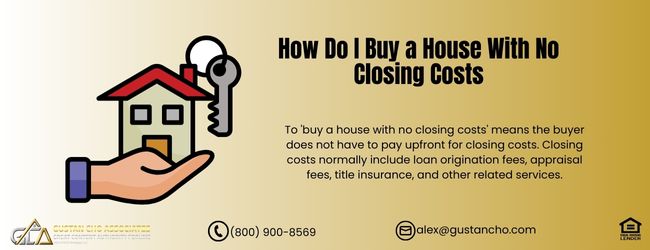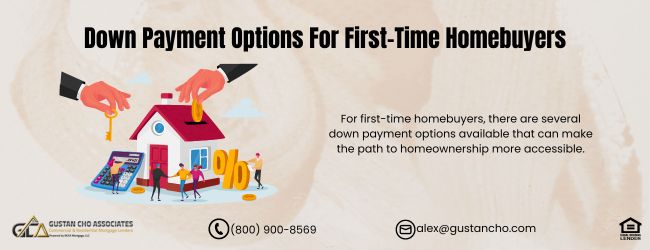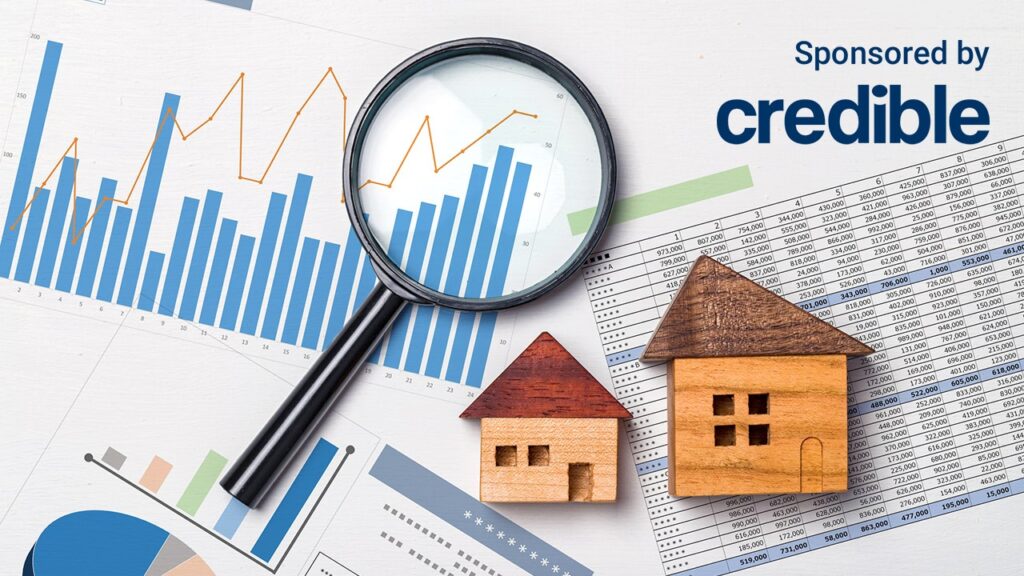How Do I Buy a House With No Closing Costs

This guide covers how to buy a house with no closing costs. There are two types of costs when buying a house: The down payment and closing costs. Homebuyers need to come up with the down payment. The down payment is a fixed percentage of the purchase price. Down payment can get gifted by family or close friends. Closing costs varies on the area, type of property, type of loan, loan amount, and other factors. Closing costs can run between 2% to 6% or more. Most clients at GCA FORUMS Mortgage Group do not pay closing costs out of pocket. Closing costs are normally paid for with a seller concession by the home seller. Each home mortgage program has its cap on the maximum seller concession the home seller can contribute.
What Are Closing Costs
Closing costs are not a set amount. Closing costs depend on the property’s location, type of property, loan size, origination charges of the lenders, discount points, and other third-party costs and fees. Closing costs range anywhere between 2% to 6% or more. In the following paragraphs, we will cover using seller concessions to cover closing costs on home purchase transactions. Speak With Our Loan Officer for Mortgage Loans
What is Seller Concessions
What is a seller concession? Seller concessions mean the seller paid closing costs. The seller can contribute a dollar amount or a percentage towards your closing costs. A seller concession is when the home seller inflates the cost of the home purchase by the cost of the seller concession. Say the home seller wants a bottom-line price of $100,000 on the sale of their home. However, for the homebuyer to purchase the home, the buyers need $6,000 in closing cost credits they do not have. The buyers only have a 3.5% down payment. So, the home sellers can increase the purchase price to $106,000 and give the buyers a $6,000 seller concession to cover their closing costs.
How Does Seller Concessions To Cover Closing Costs Work
If the home seller is short on covering closing costs, the lender can offer a lender credit towards the shortage of closing costs in place of a higher mortgage rate. Home sellers want to ensure the borrower closes on the home purchase contract, so many will entertain offering seller concessions. The stronger the borrower is the more the seller is willing to offer incentives such as seller concessions. Homebuyers should consider TBD Pre-approvals by lenders versus just a traditional pre-approval. In the following paragraphs, we will cover and discuss seller concessions guidelines on mortgages.
Common Closing Costs on Home Purchases
Down payments are a fixed amount of the home’s purchase price. For example, HUD requires a 3.5% down payment on a home purchase on FHA loans. Fannie Mae and Freddie Mac require a 3% to 5% down payment on conventional loans. VA and USDA loans do not require any down payment on a home purchase. Lenders offer 100% financing on VA and USDA loans. However, closing costs vary between 2% to 6% or more. The following are examples of closing costs on home purchases:
- Home appraisals
- Pre-paid property taxes
- Home inspection
- One year’s upfront hazard insurance premium
- Pre-paid interest
- Attorney fees, if applicable
- Recording fees
- Lender origination fees
- Lender discount points
- Title search and insurance costs
- FHA upfront mortgage insurance can be rolled into the balance of the FHA loan
Seller concessions, sometimes called seller credits, can be a confusing mortgage topic. The team at GCA FORUMS Mortgage Group will detail how to utilize seller concessions. We will explain the maximum seller concessions allowed per loan product and your minimum investment requirement. Seller concessions are becoming more common in the mortgage market. This is due to the increase in home values across the country. The amount of seller concessions allowed varies with each loan product. Your loan cannot be funded if you get more credit than the maximum allowed. Staying within these threshold numbers is important, even after any renegotiations. We will dive into that topic soon. Click Here To Buy A House Today
Seller Concessions on Government, Conventional, and Non-QM Loans
FHA loans allow a home seller to contribute 6% of the purchase price for a homebuyer’s closing costs. Seller concession on conventional loans for a primary residence is 3% of the purchase price for any LTV of 90% or higher. 6% of the purchase price for any LTV of 75.01% to 90%. 9% of the purchase price for any LTV of 75% or less.
VA loans have a maximum of 4% of the purchase price for seller concessions. USDA Mortgage allows a 6% seller concession of the purchase price.
Seller concession on NON-QM loans depends on the individual wholesale lender. However, most non-QM lenders generally allow a 6% seller concession of the purchase price. Fannie Mae and Freddie Mac allow seller concessions on Conventional loans on investment properties of 2% of the purchase price. NON-QM lenders often limit seller concession on investment properties to 2% of the purchase price
Can Seller Concessions To Pay Closing Costs Be Negotiated
When do you negotiate seller concessions? There are two main times in which seller credits are negotiated. Upfront when you submit your offer to the seller and once again after the home inspection. Asking for seller credit when you place your offer is common. Home prices are rising again, and more and more funds are needed to purchase a home. The rise in seller credit is a trend we have seen throughout the mortgage industry. The next time seller concessions are negotiated is after you receive your home inspection report.
Importance of Home Inspections
A home inspection is different than a home appraisal. We do not require an inspection, but we highly recommend completing one. You are buying a long-term asset. Most homes cost hundreds of thousands of dollars. A couple of hundred dollars upfront to inspect the home is a great idea for such a large investment.
Please see our HOME INSPECTION BLOG for more details.
Buying a House With Needed Repairs and Deferred Maintenance
Once you inspect the home and receive the report, you may notice a few items that need fixing. Any major items, such as holes in the wall or missing windows or railings, must be completed before the lender may close that mortgage. Smaller items like dated carpets, older appliances, or faulty windows can be the go. She ate it into seller concessions. Let’s say the carpet needs to be replaced throughout the house. You anticipate this to cost about $1,000. You can now negotiate with the seller and your attorneys for an additional $1,000 seller credit. This will come off the final dollar amount you need to bring to closing, freeing up money for you to replace the carpet after closing.
Caps on Seller Concessions By The Home Seller
As stated above, you must stay under the maximum seller credit thresholds for your loan products. The amount of seller concessions you negotiate upfront and the seller concessions you ask for after the home inspection must be below the allowable threshold. Seller concessions are lumped into one cumulative total, which must be under the threshold.
Who will coordinate the negotiations surrounding seller concessions? Your realtor negotiates seller concessions asked for at the time of submitting your offer. You will add these concessions to your submitted contract if you are not using a realtor.
Seller concessions are requested after your home purchase contract negotiations by your real estate agent. If you are not using a real estate attorney, your realtor should be able to negotiate these with the seller’s agent. If you are not using a real estate agent, you are on your own for the negotiations. Please check out our article on the benefits of USING A REALTOR for your transaction.
Mortgage Guidelines on Seller Concession Overages
Can you ask for too much credit? You may not exceed the maximum percentage threshold of seller credits for your specific loan product. Assuming you are under that threshold, any remaining seller credit will be applied to buying your interest rate down. Lenders require a minimum down payment on a home purchase. The minimum down payment requirement depends on the individual mortgage loan program. For example, with an FHA mortgage, you must contribute a minimum of 3.5% towards the closing of your verified funds. In states like Illinois, where property taxes are paid in arrears, you may not need to bring the full 3.5%. The rule of minimum investment requirements is 3.5% minus the tax prorations. Many borrowers get confused with minimum investment requirements. Speak With Our Loan Officer for Mortgage Loans
Lenders Steering Borrowers To Preferred Lenders
Builder’s lenders and incentives to use their lender. You have talked to the builder’s lender if you are building a home. The majority of builders have a working relationship with a mortgage company. The only way most homebuilders will give the same incentives to a buyer going to a different lender is when the borrower was denied by the preferred lender. Typically, the builders’ preferred lender will give home builders incentives to use them. This is because the builder has a financial interest in that lender. Home Builders often offer you a large seller credit utilizing their lender. Home Builders usually tell you the incentives will go away if you do not use their lender. We have seen numerous cases where that is just a smokescreen. Of course, they want you to use their lender, but they must also sell their homes.
Incentives By Home Builders For Using Builder’s Preferred Lenders
We have closed numerous new construction mortgages where builders still gave the incentives and used GCA FORUMS Mortgage Group as their lender. If these incentives are over 3% or 6% (depending on the loan program) of the purchase price, they will lower the purchase price. The main takeaway on new construction incentives is not letting the builder bully you into utilizing their lender. Builders cannot steer homebuyers to their preferred lenders but they do them anyways. Most builder’s lenders have strict LENDER OVERLAYS. This is why many families cannot qualify for them. Don’t be afraid to demand the incentives and work with GCA FORUMS Mortgage Group as your lender! The team at GCA FORUMS Mortgage Group is available seven days a week, evenings, weekends, and holidays.
FAQ on How To Buy a House With No Closing Costs
The following are frequently asked questions when purchasing a house concerning the closing costs:
What is it to buy a house with no closing costs?
When giving out such an explanation, understanding what it means to ‘buy a house with no closing costs’ means the buyer does not have to pay upfront for closing costs. Closing costs normally include loan origination fees, appraisal fees, title insurance, and other related services. Additional such costs are paid for by the seller, included in the mortgage, or subsidized by the lender through special programs or other loan benefits.
What are the ways that I can buy a house with no closing costs?
There are other popular methods of purchasing a house without incurring any closing costs.
- Seller concessions: The seller agrees to cover certain expenses, like some or even all of your closing costs, so you can complete the transaction.
- Lender credits: The closing costs will be paid by the lender, which can be offered as a ‘no closing cost’ loan at the expense of raising the interest rate.
- Rolling costs into the loan. This method allows borrowing to add up your closing costs to your mortgage, which means you will pay for those costs in installments for the duration of the loan rather than paying all of it at once.
What seller concessions are, and how do they relate to closing costs?
Seller concessions are contracts whereby the seller in a real estate transaction undertakes to pay for a portion or all of the closing costs that the buyer owes. Such details will likely be worked out when the purchase agreement is negotiated. Seller concessions are frequent in buyer’s markets or when sellers want to make sales quickly. Nonetheless, some rules state how much a seller can be concerned about a particular loan type (conventional, FHA, VA, USDA, and Non-QM loans). Loosen them.
What is a lender credit, and how does it work to avoid the costs related to closing?
When the lender agrees to pay closing costs upfront and charges you a higher interest rate on your mortgage, a lender credit, the benefit is that the closing costs are not paid out-of-pocket at closing. However, the disadvantage is that the borrower will make higher payments later due to a higher interest rate.
Can I ask the seller to pay for my closing costs?
Yes, you can negotiate with the seller and ask them to pay a part of the closing cost. This is more likely in a buyer’s market where the sellers want to sell their houses fast or the property has been sitting on the market for too long. Even then, the seller may raise the price of the house to recoup his costs, so the final effect on your mortgage must be examined.
Do these loan programs exist that do not require you to pay any penny to the closing costs?
Yes, there are some loan programs and some lenders that provide options for zero closing costs mortgages. Such options usually attract high interest rates or other stiffer requirements. Some government-sponsored loans such as the FHA, VA, and USDA loans allow certain seller concessions and closing costs paid by the lender, thus making it possible to buy a house without any closing costs.
Can I add the closing costs to my loan amount?
On some occasions, closing costs can be added to the mortgage. It raises the mortgage amount and amortizes that cost over the mortgage term, which implies payments on interest for those costs will be made. This option mostly applies to refinance loans but may also be offered on some purchase loans.
What are the drawbacks of “No Closing Cost Loans”?
The most pronounced hip of a closing cost loan is that it attracts a higher taxable rate. This can contribute to higher payments over time. Moreover, trekking funding within closing costs adds to the debt, which may affect your equity and monthly payment balances.
Is there a limit to the seller’s contribution towards the closing cost incurred by the buyer?
Yes, there are restrictions based on the nature of the loan.
- FHA loans: The seller might contribute within 6% of the price at which the house was sold.
- VA Loans from the Veterans Administration: Sellers can contribute 4% of the debt.
- Conventional loans. This area is covered with a garnishing down payment of 3% or more depending on whether the low financing is common or a further increment of 6% on a larger mortgage financing occurs.
How does it work?
Does promotional engagement help reduce other costs, like closing costs?
A few programs offered for down payment assistance will also help with closing costs. Some of these programs have grants for low-interest loans or deferred payment loans to pay for the down payment and closing costs. Available programs can be contacted through your local or state housing authority.
Can I use gift funds to pay my closing costs?
Applying funds from family members, employers, or working charitable organizations to the loan’s closing costs is permissible in many loan programs. The donor will also have to provide a gift letter, in a standard format, confirming the state of the amount given, which is a gift and not a loan.
What is the distinction between a no-closing-cost mortgage and a traditional mortgage?
Under a no-closing-cost mortgage, the lender satisfies the borrower’s costs for closing the loan but increases the interest rates on the loan. In a conventional loan, the borrower pays all closing costs at the set payment date. In this case, it depends on where you would rather shell out a larger amount initially or over the months by adding high monthly premiums.
Do these no-closing-cost loans affect my chances of getting a mortgage?
No-closing-cost loans usually do not impair one’s chances of getting a mortgage. The exception rests within the high interest rates, which form part of the debt-to-income ratio weighted during the approval. Make sure to work closely with your lender to remain eligible.
Is there a possibility of a no-closing cost refinance?
No closing cost refinancing options are very prevalent in certain lenders. These enable you to avoid closing costs at the beginning of the refinance mortgage by agreeing to a higher interest rate. This may be good if you do not want to pay the costs related to the mortgage refinance. However, one shouldn’t remember to work out if the costs associated with the higher interest rate, in the long run, will be worth the benefit foregone in paying the closing costs.
Can I use seller concessions and lender credits to zero closing costs?
Indeed, seller concessions can be employed with lender credits, which implies using credit that covers most or all closing costs. This strategy allows the borrower to avoid spending on the closing costs, but of course, this has its limitations as well – credits from lenders tend to push up the interest rate, and there’s a cap on how much a seller can offer.
These FAQs have touched upon some of the most important aspects when considering buying a home without closing costs. Speak With Our Loan Officer for Mortgage Loans







Responses